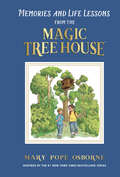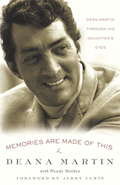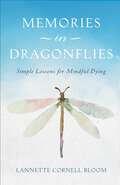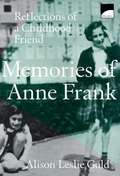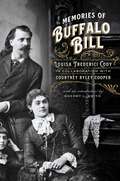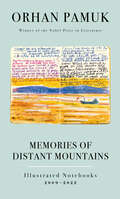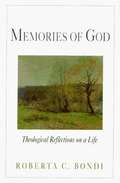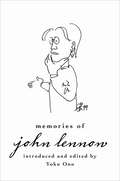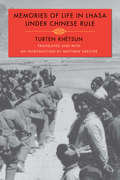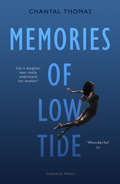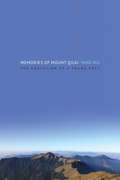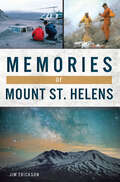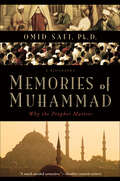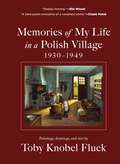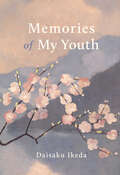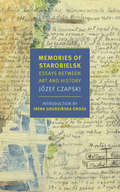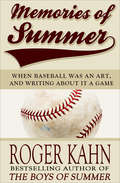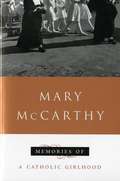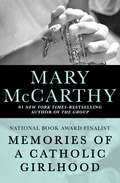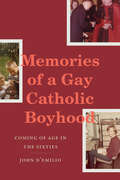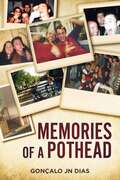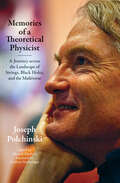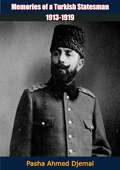- Table View
- List View
Memories and Life Lessons from the Magic Tree House (Magic Tree House (R))
by Mary Pope OsborneCelebrate the 30th anniversary of the #1 New York Times bestselling series with heartfelt advice from Mary Pope Osborne's own life and her magical adventures with Jack and Annie—perfect for Magic Tree House fans of all ages!Look for heroes, far and near. Give your gifts to the world. Have compassion for all creatures. These are just a few of the lessons that Magic Tree House fans will learn on their magical journey through this book. With quotes from the series and classic art by Sal Murdocca, Mary Pope Osborne, beloved author of the #1 bestselling Magic Tree House series, shares the wisdom she's gained from her own childhood and thirty years of whisking Jack and Annie away in the magic tree house.
Memories are Made of This: Dean Martin Through His Daughter's Eyes
by Wendy Holden Deana MartinI loved being called Deana Martin. Even when I was very small. Dad was such a positive influence on people's lives that to be so closely associated with him was always a blessing. People can't help but smile when they think of my father, which has to be the greatest legacy of all. When people hear my name for the first time, they usually ask the same question: "Any relation?" "Yes," I reply proudly, "he's my father. " They smile and cry, "Oh, I love your father! I've loved him all my life. " Sometimes, just sometimes, they ask me the most important question of all: "Was he a good father?" To their surprise, I shake my head and smile. "No," I reply. "He wasn't a good father, but he was a good man. " Where Dad came from, that meant a great deal more. So begins Deana Martin's captivating and heartfelt memoir of her father, the son of an Italian immigrant from modest beginnings who worked his way to the top of the Hollywood firmament to become one of the greatest stars of all time. Charming, debonair, and impeccably attired in a black tuxedo, Dean Martin was coolness incarnate. His music provided the soundtrack of romance, and his image captivated movie and television audiences for more than fifty years. His daughter Deana was among his most devoted fans, but she also knew a side of him that few others ever glimpsed. In page-turning prose, Deana recalls her early childhood, when she and her siblings were left in the erratic care of Dean's loving but alcoholic first wife. She chronicles the constantly changing blended family that marked her youth, along with the unexpected moments of silliness and tenderness that this unusual Hollywood family shared. Deana candidly reveals the impact of Dean's fame and characteristic aloofness on her efforts to forge her own identity, but delights in sharing wonderful, never-before-told stories about her father and his pallies known as the Rat Pack. It may not have been a normal childhood, but Deana's enchanting account of life as the daughter of one of Hollywood's sexiest icons will leave you entertained, delighted, and nostalgic for a time gone by. "From her heart, Deana Martin has told a frank and honest account of what her life was like with her famous father and family. It has been a wild ride, with lots of ups and downs, written with honesty, love, and understanding. " --Regis Philbin "Dean Martin was the unique star who attained success in all of the entertainment media--movies, TV, recordings, concerts, and radio. His daughter Deana gives us something else that is also unique in this revealing book about growing up as the daughter of a true legend. Here's to you Dean. I've got the booze, you get the ice. " --Don Rickles "I have to say I loved reading what Deana wrote--maybe because she bit the bullet, she was courageous, up-front, tenacious, and so totally forthright. I read it with tremendous pride and love, and I know other readers will feel the same emotions I felt. I love this author for a myriad of reasons, but especially for how she has honored my partner. "--from the Foreword by Jerry Lewis
Memories in Dragonflies: Simple Lessons for Mindful Dying
by Lannette Cornell BloomLife—and death—may be hard; but joy is simple. Lannette Cornell Bloom, a typical, overworked nurse, wife, and mom of two, was forty-three when her mother was diagnosed with pulmonary fibrosis. She quit her job and dove headlong into the familiar role of caretaking. This choice—to slow down and be present for the hardest year of her life—resulted in an awakening. In unexpected moments, as childhood memories flooded into the present, Lannette glimpsed bits of magic that existed just beyond the pain. Without knowing it, she was experiencing a mindful dying process with her mother—and it was a journey that would change the way she lived the rest of her life. A touching and soulful memoir that gracefully uncovers the beauty that is often lost within the dying process, Memories in Dragonflies is a beautiful portrait of what it means to be human and a gentle reminder to enjoy every moment, because even the simplest ones bring lasting joy.
Memories of Anne Frank: Reflections of a Childhood Friend
by Alison Leslie GoldHannah Goslar lived next door to Anne Frank in Amsterdam. Hannah recalls the funny, bright girl who suddenly disappeared from her life--until they met again at a concentration camp.
Memories of Buffalo Bill (The Papers of William F. "Buffalo Bill" Cody)
by Louisa Frederici CodyWritten with the help of Courtney Ryley Cooper, Memories of Buffalo Bill offers an idealized account of William F. Cody&’s life from the perspective of his wife, Louisa. True to its origins, this account offers many more details about Cody&’s domestic life, including his children, than any other preceding work. Although William and Louisa&’s real-life marriage was marred by some high-profile scandals, it endured until her husband&’s death in 1917.Memories of Buffalo Bill, the first biography of William F. Cody to appear after his death, strikes a celebratory tone in narrating highlights of his life and enterprises. Through its introduction, notes, and appendixes, this edition offers a broader context for the Codys&’ marriage, evidencing its private realities and the collaboration required to preserve the Buffalo Bill image in the public eye. Out of print since its first publication, Louisa Cody&’s memoir highlights the processes involved in crafting and preserving a national myth. Both for what it does and does not say, it was the first step in laying a foundation for the enduring legacy of Buffalo Bill as an American icon.
Memories of Distant Mountains: Illustrated Notebooks, 2009-2022
by Orhan PamukWINNER OF THE NOBEL PRIZE IN LITERATURE • Beautiful, full-colour selections from Orhan Pamuk&’s selected art notebooks.&“One of the world's finest living writers.&” The Independent&“In this world of forgeries, where some might be in danger of losing their faith in literature, Pamuk is the real thing.&” The ObserverFor many years, Orhan Pamuk kept a record of his daily thoughts and observations, entering them in small notebooks and illustrating them with his own paintings. This book combines those notebooks into one volume. He writes about his travels around the world, his family, his writing process, and his complex relationship with his home country of Turkey. He charts the seeds of his novels and the things that inspired his characters and the plots of his stories. Intertwined in his writings are the vibrant paintings of the landscapes that surround and inspire him.A beautiful object in its own right, in Memories of Distant Mountains readers can explore Pamuk's intoxicating inner world and can have a fascinating, intimate encounter with the art, culture, and charged political currents that have shaped one of literature&’s most important voices.
Memories of Distant Mountains: Illustrated Notebooks, 2009-2022
by Orhan PamukThe journals of the Nobel Prize–winning author, beautifully illustrated with his own paintingsFor many years, Orhan Pamuk kept a record of his daily thoughts and observations, entering them in small notebooks and illustrating them with his own paintings. This book combines those notebooks into one volume. He writes about his travels around the world, his family, his writing process, and his complex relationship with his home country of Turkey. He charts the seeds of his novels and the things that inspired his characters and the plots of his stories. Intertwined in his writings are the vibrant paintings of the landscapes that surround and inspire him.A beautiful object in its own right, in Memories of Distant Mountains readers can explore Pamuk's intoxicating inner world and can have a fascinating, intimate encounter with the art, culture, and charged political currents that have shaped one of literature&’s most important voices.
Memories of God: Theological Reflections on a Life
by Roberta C. BondiWhen the hearing and telling of stories captures our imaginations, we are enabled at the deepest level to take our lives seriously. By envisioning other worlds, we are rendered capable of listening to God and to ourselves, and of growing in God's image. This is how Roberta Bondi comes to tell stories in this book, stories that were formed in a life of prayer. They reflect on life's turning points and how these are made both more difficult and more open to grace by the Christian understandings of naming God as father and mother; the significance of rationality; and the incarnation, crucifixion, and resurrection of Jesus. Bondi discovered that what she had regarded as her personal, private stories were not really so private or idiosyncratic after all when they were seen in the intersection of her beliefs, family experience, and cultural expectations. We are drawn into thelogical reflection on the stories of one woman only to discover there our own stories, our own memories, all stored in the memory of God.
Memories of John Lennon
by Yoko Ono“A wonderful book for fans of Lennon. . . . Highly recommended.” —Library JournalJohn Lennon . . . as much a part of our world today as he ever wasHe touched many lives in his brief forty years, and continues to move and inspire millions more to this day. Now, invited by Yoko Ono, friends, family, and fans from all walks of life—including some of the great artists of our day—reminisce about Lennon as a visionary and friend, musician and performer, husband and father, activist and jokester.In their own words and drawings, poems and photos, Lennon's life from his childhood through the Beatles years to the happiness and tragedy of his final days become stunningly vivid.Intimate glimpses gathered from musicians who knew John, such as Pete Townshend, Sir Elton John, Billy Preston, and Joan Baez; friends and relatives such as producer David Geffen, publicist Elliot Mintz, and cousin Mike Cadwallader; and artists who followed him such as Bono, Alicia Keys, Steve Earle, Jello Biafra, and Carlos Santana.And, for the first time, renowned photographer Annie Liebovitz presents every frame of the historic last session with John and Yoko.Memories of John Lennon is a rich and deeply felt appreciation of a truly great man.“Heartfelt . . . poignant reminders of why Lennon was so widely mourned and is missed to this day.” —Booklist
Memories of Life in Lhasa Under Chinese Rule: An Autobiography
by Tubten KhétsunBorn in 1941, Tubten Khétsun is a nephew of the Gyatso Tashi Khendrung, one of the senior government officials taken prisoner after the Tibetan peoples' uprising of March 10, 1959. Khétsun himself was arrested while defending the Dalai Lama's summer palace, and after four years in prisons and labor camps, he spent close to two decades in Lhasa as a requisitioned laborer and "class enemy." In this eloquent autobiography, Khétsun describes what life was like during those troubled years. His account is one of the most dispassionate, detailed, and readable firsthand descriptions yet published of Tibet under the Communist occupation. Khétsun talks of his prison experiences as well as the state of civil society following his release, and he offers keenly observed accounts of well-known events, such as the launch of the Cultural Revolution, as well as lesser-known aspects of everyday life in occupied Lhasa. Since Communist China continues to occupy Tibet, the facts of this era remain obscure, and few of those who lived through it have recorded their experiences at length. Khétsun's story will captivate any reader seeking a refreshingly human account of what occurred during the Maoists' shockingly brutal regime.
Memories of Low Tide
by Chantal ThomasA memoir of childhood, the mother-daughter bond and the transformative power of swimming, by multi-award-winning French author Chantal ThomasChantal Thomas grew up in a seaside town on the Atlantic coast of France, inheriting from her mother an obsession with the sea, and for swimming. In this tender and eloquent memoir she seeks to understand her quixotic, often inscrutable mother - a woman who was luminous in the water and once dived into the moat of the Palace of Versailles, but became fettered by marriage and domestic life.Thomas combs the beaches of her childhood for memories, recalling the sensory pleasures of the sands, the first sharp touch of cold water, and discovering the multitude of ways in which she is still her mother's daughter.
Memories of Mount Qilai: The Education of a Young Poet (Modern Chinese Literature from Taiwan)
by Yang MuHualien, on the Pacific coast of eastern Taiwan, and its mountains, especially Mount Qilai, were deeply inspirational for the young poet Yang Mu. A place of immense natural beauty and cultural heterogeneity, the city was also a site of extensive social, political, and cultural change in the twentieth century, from the Japanese occupation and the American bombings of World War II to the Chinese civil war, the White Terror, and the Cold War.Taken as a whole, these evocative and allusive autobiographical essays provide a personal response to history as Taiwan transitioned from a Japanese colony to the Republic of China. Yang Mu recounts his childhood experiences under the Japanese, life in the mountains in proximity to indigenous people as his family took refuge from the American bombings, his initial encounters and cultural conflicts with Nationalist soldiers recently arrived from mainland China, the subsequent activities of the Nationalist government to consolidate power, and the island's burgeoning new manufacturing society. Nevertheless, throughout those early years, Yang Mu remained anchored by a sense of place on Taiwan's eastern coast and amid its coastal mountains, over which stands Mount Qilai like a guardian spirit. This was the formative milieu of the young poet. Yang Mu seized on verse to develop a distinct persona and draw meaning from the currents of change reshuffling his world. These eloquent essays create an exciting, subjective realm meant to transcend the personal and historical limitations of the individual and the end of culture, "plundered and polluted by politics and industry long ago."
Memories of Mount St. Helens
by Jim Erickson&“Takes a local and regional perspective in looking back on the mountain&’s history, the frenzied days surrounding the eruption, and its aftermath.&” —The Oregonian In the spring of 1980, Mount St. Helens awoke from a century-long slumber with a series of dramatic changes. Most threatening was a bulge on the side of the snowy peak, pushing steadily outward. Near Spirit Lake, local resident Harry Truman refused to leave his lodge, even as scientists like David Johnston warned about potential destruction. On May 18, the mountain finally blew, enveloping whole communities in ash and smoke. Mudflows destroyed bridges, houses and highways, and fifty-seven people, including Truman and Johnston, lost their lives. Today, the mountain is quiet. Plants and animals have returned and hiking trails have been rebuilt, but the scars remain. Join author and journalist Jim Erickson as he recounts the unforgettable saga of the Mount St. Helens eruption.</
Memories of Muhammad: Why the Prophet Matters
by Omid SafiIn Memories of Muhammad: Why the Prophet Matters, leading Islamic scholar Omid Safi presents a portrait of Muhammad that reveals his centrality in the devotions of modern Muslims around the world. This religious biography offers new insights into Islam, covering such hot button issues such as the spread of Islam, holy wars, the role of women, the significance of Jerusalem, tensions with Jews and Christians, wahabbi Islam, and the role of cyberspace in the evolution of the religion.
Memories of My Life in a Polish Village, 1930-1949
by Toby Knobel FluekAvailable again for the first time in decades, this jewel of a memoir is the poignant story of a young Jewish girl growing up in a Polish farm village, from the peaceful early 1930s through the tragic war years, and finding safe harbor at last. “Deeply moving”—Elie Wiesel “A tone poem evocative of a vanished world”—Chaim Potok In her own words and with her own beautiful paintings and drawings, artist Toby Knobel Fluek (1926–2011) lovingly unfurls a unique view of Jewish life. She introduces us to her village, to her family, to the people among whom they lived; she shows us how customs and holidays were observed; and, with both feeling and restraint, she illustrates how this long-enduring way of life was shattered by World War II. She depicts her family’s experiences through Russian occupation and the devastation wreaked by the Nazis—and, finally, her new beginning in America. New to this edition is a foreword by Rakhmiel Peltz, PhD, PhD, Founding Director of the Judaic Studies Program at Drexel University, which he led for twenty years.
Memories of My Youth
by Daisaku IkedaFrom these touching personal essays, written some fifty years ago, wegain not only new insights into Daisaku Ikeda's opposition to war, fascism, andall forces that diminish the value of life but a new appreciationfor this man from humble beginnings whose commitment to peaceremained unbending until his passing in 2023 at age ninety-five.
Memories of Starobielsk: Essays Between Art and History
by Jozef CzapskiVivid accounts of life in a Soviet prison camp by the author of Inhuman Land.Interned with thousands of Polish officers in the Soviet prisoner-of-war camp at Starobielsk in September 1939, Józef Czapski was one of a very small number to survive the massacre in the forest of Katyń in April 1940. Memories of Starobielsk portrays these doomed men, some with the detail of a finished portrait, others in vivid sketches that mingle intimacy with respect, as Czapski describes their struggle to remain human under hopeless circumstances. Essays on art, history, and literature complement the memoir, showing Czapski&’s lifelong engagement with Russian culture. The short pieces on painting that he wrote while on a train traveling from Moscow to the Second Polish Army&’s strategic base in Central Asia stand among his most lyrical and insightful reflections on art.
Memories of Summer: When Baseball Was an Art, and Writing about It a Game
by Roger KahnThe legendary sportswriter&’s memoir of Brooklyn, baseball, and a life in journalism: &“Simply put, this is a marvelous book&” (Kirkus Reviews). In this book, the bestselling author of The Boys of Summer shares stories of his Depression-era Brooklyn childhood, his career during a golden era of sports, and his personal acquaintances with a wide range of great ballplayers. His father had a passion for the Dodgers; his mother&’s passion was for poetry. Young Roger managed to blend both loves in a career that encompassed writing about sports for the New York Herald Tribune, Sports Illustrated, the Saturday Evening Post, Esquire, and Time. Kahn recalls the great personalities—Leo Durocher, Mickey Mantle, Willie Mays, Jackie Robinson, Red Smith, Dick Young, and many more—and recollects the wittiest lines from forty years in dugouts, press boxes, and newsrooms. &“A master at evoking a sense of the past . . . A pleasing potpourri of autobiography, professional memoir, and anecdotal baseball history . . . Of special note to journalism buffs is Kahn&’s account of his role in the inception of Sports Illustrated.&” —Booklist &“As a kid, I loved sports first and writing second, and loved everything Roger Kahn wrote. As an adult, I love writing first and sports second, and love Roger Kahn even more.&” —David Maraniss, Pulitzer Prize–winning journalist and author &“Roger Kahn is the best baseball writer in the business.&” —Stephen Jay Gould, New York Review of Books
Memories of a Catholic Girlhood
by Mary MccarthyThis unique autobiography begins with McCarthy's recollections of an indulgent, idyllic childhood tragically altered by the death of her parents in the influenza epidemic of 1918.
Memories of a Catholic Girlhood: How I Grew, Intellectual Memoirs (Penguin Twentieth Century Classics)
by Mary McCarthyTracing her moral struggles to the day she accidentally took a sip of water before her Communion—a mortal sin—Mary McCarthy gives us eight funny and heartrending essays about the illusive and redemptive nature of memory&“During the course of writing this, I&’ve often wished that I were writing fiction.&”Originally published in large part as standalone essays in the New Yorker and Harper&’s Bazaar, Mary McCarthy&’s acclaimed memoir begins with her recollections of a happy childhood cut tragically short by the death of her parents during the influenza epidemic of 1918.Tempering memory with invention, McCarthy describes how, orphaned at six, she spent much of her childhood shuttled between two sets of grandparents and three religions—Catholic, Protestant, and Jewish. One of four children, she suffered abuse at the hands of her great-aunt and uncle until she moved to Seattle to be raised by her maternal grandparents. Early on, McCarthy lets the reader in on her secret: The chapter you just read may not be wholly reliable—facts have been distilled through the hazy lens of time and distance.In Memories of a Catholic Girlhood, McCarthy pays homage to the past and creates hope for the future. Reminiscent of Nabokov&’s Speak, Memory, this is a funny, honest, and unsparing account blessed with the holy sacraments of forgiveness, love, and redemption.This ebook features an illustrated biography of Mary McCarthy including rare images from the author&’s estate.
Memories of a Gay Catholic Boyhood: Coming of Age in the Sixties
by John D'EmilioJohn D’Emilio is one of the leading historians of his generation and a pioneering figure in the field of LGBTQ history. At times his life has been seemingly at odds with his upbringing. How does a boy from an Italian immigrant family in which everyone unfailingly went to confession and Sunday Mass become a lapsed Catholic? How does a family who worshipped Senator Joseph McCarthy and supported Richard Nixon produce an antiwar activist and pacifist? How does a family in which the word divorce was never spoken raise a son who comes to explore the hidden gay sexual underworld of New York City?Memories of a Gay Catholic Boyhood is D’Emilio’s coming-of-age story in which he takes readers from his working-class Bronx neighborhood to an elite Jesuit high school in Manhattan to Columbia University and the political and social upheavals of the late 1960s. He shares his personal experiences of growing up in a conservative, tight-knit, multigenerational family, how he went from considering entering the priesthood to losing his faith and coming to terms with his same-sex desires. Throughout, D’Emilio outlines his complicated relationship with his family while showing how his passion for activism influenced his decision to use research, writing, and teaching to build a strong LGBTQ movement.This is not just John D’Emilio’s personal story; it opens a window into how the conformist baby boom decade of the 1950s transformed into the tumultuous years of radical social movements and widespread protest during the 1960s. It is the story of what happens when different cultures and values collide and the tensions and possibilities for personal discovery and growth that emerge. Intimate and honest, D’Emilio’s story will resonate with anyone who has had to chart their own path in a world they did not expect to find.
Memories of a Pothead: My Fight for the Legalization of Marijuana
by Gonçalo Jn DiasA biographic book I hope my children will never read. Reading my diary, 20 years later, some questions come up quickly: how am I still alive? How come I have never been arrested? The book tells my day-to-day life during my time as a college student in which besides drinking beer and smoking pot regularly, I also had street fights, stole, had sexual intercourse with stranger women, brought drugs from Holland, damaged public places, fell in love and cried. A politically incorrect book I hope my children will never read.
Memories of a Theoretical Physicist: A Journey across the Landscape of Strings, Black Holes, and the Multiverse
by Joseph PolchinskiA groundbreaking theoretical physicist traces his career, reflecting on the successes and failures, triumphs and insecurities of a life cut short by cancer.The groundbreaking theoretical physicist Joseph Polchinski explained the genesis of his memoir this way: &“Having only two bodies of knowledge, myself and physics, I decided to write an autobiography about my development as a theoretical physicist.&” In this posthumously published account of his life and work, Polchinski (1954–2018) describes successes and failures, triumphs and insecurities, and the sheer persistence that led to his greatest discoveries. Writing engagingly and accessibly, with the wry humor for which he was known, Polchinski gives theoretical physics a very human face. Polchinski, famous for his contributions to string theory, may have changed the course of modern theoretical physics, but he was a late bloomer—doing most of his important work after the age of forty. His death from brain cancer at sixty-three cut short a career at its peak. Working on the memoir after his diagnosis, using a text-to-speech algorithm because he could no longer read words on a page, he was able to recapitulate his entire career, down to the details of problems he had worked on. For Polchinski, physics went deeper than words. This edition includes photographs from Polchinski&’s professional and family life, as well as physics explainer boxes, other technical edits, and bibliographic notes by his former student Ahmad Almheiri, a foreword by Andrew Strominger, and an afterword by his wife Dorothy Chun and sons Steven and Daniel.
Memories of a Turkish Statesman, 1913-1919
by Pasha Ahmed DjemalMY personal participation in general politics in the Ottoman Empire begins with the coup d’état of January 23, 1913.On the evening of that day I left the headquarters of the Lines of Communication Inspectorate and went to the Sublime Porte, to which a great crowd was flocking at the time.At that moment Mahmud Shefket Pasha, who had been appointed Grand Vizier a few hours before, returned from the Imperial Palace and met me at the entrance to the Grand Vizier’s palace.He had hardly seen me before he called out: “Djemal Bey, I want you to take over the Military Governorship of Constantinople at once and you must not lose a minute in taking all measures you think necessary for the preservation of order and confidence in the capital.”As I have said, my assumption of the highly important and equally responsible office of Military Governor of Constantinople meant my direct participation in general politics in my Fatherland. I thus find myself compelled to start my memoirs at that point.—Pasha Ahmed Djemal
